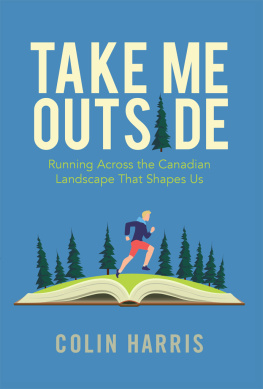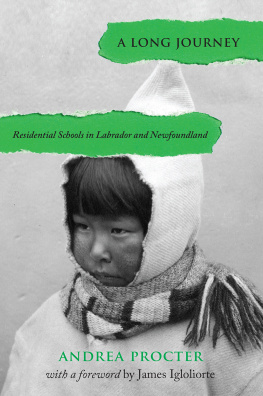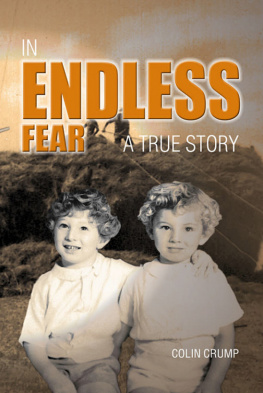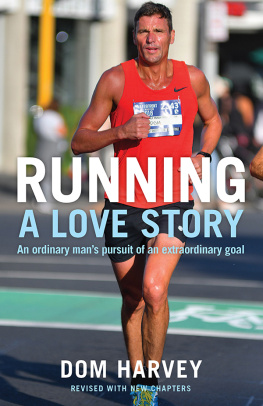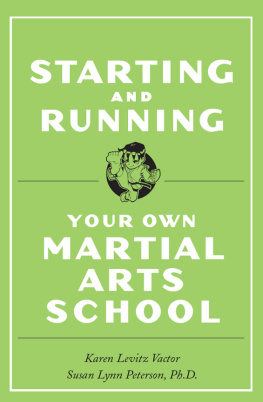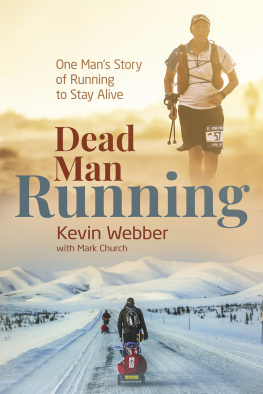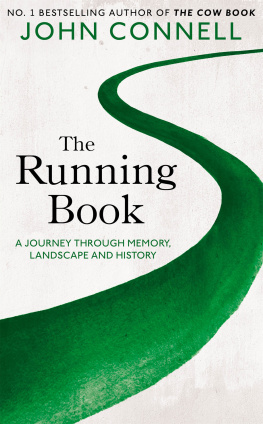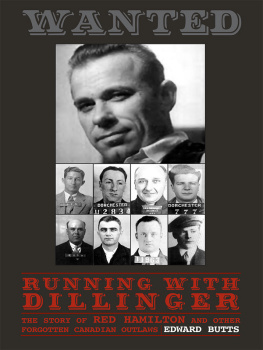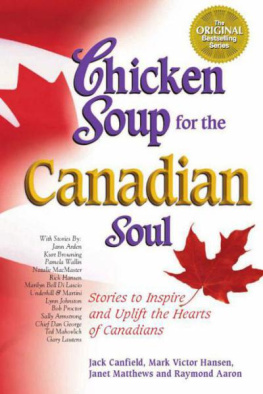TAKE ME OUTSIDE
Running Across the Canadian Landscape That Shapes Us
COLIN HARRIS

Copyright 2021 by Colin Harris
First Edition
For information on purchasing bulk quantities of this book, or to obtain media excerpts or invite the author to speak at an event, please visit rmbooks.com and select the Contact tab.
RMB | Rocky Mountain Books Ltd.
rmbooks.com
facebook.com/rmbooks
Cataloguing data available from Library and Archives Canada
ISBN 9781771604659 (softcover)
ISBN 9781771604666 (electronic)
Cover design by Lyuba Kirkova
We would like to also take this opportunity to acknowledge the traditional territories upon which we live and work. In Calgary, Alberta, we acknowledge the Niitstapi (Blackfoot) and the people of the Treaty 7 region in Southern Alberta, which includes the Siksika, the Piikuni, the Kainai, the Tsuutina, and the Stoney Nakoda First Nations, including Chiniki, Bearpaw, and Wesley First Nations. The City of Calgary is also home to Mtis Nation of Alberta, Region III. In Victoria, British Columbia, we acknowledge the traditional territories of the Lkwungen (Esquimalt and Songhees), Malahat, Pacheedaht, Scianew, TSou-ke, and W SNE (Pauquachin, Tsartlip, Tsawout, Tseycum) peoples.
We acknowledge the financial support of the Government of Canada through the Canada Book Fund and the Canada Council for the Arts, and of the province of British Columbia through the British Columbia Arts Council and the Book Publishing Tax Credit.

For my parents, Ray and Cathie Harris

CONTENTS
PROLOGUE
When you think about Canadians, you might ask yourself: Why are we the way we are? Well the answer is lying right under our feet, literally. Fact is, its this land that shapes us. Theres a reason why we run off the dock instead of tippy-toe in. Its because that water is frozen six months a year. And that frozen water brought on a sport that we can call our own. This land is unlike any other. We have more square feet of awesomeness per person than any other nation on Earth. Its why we flock towards lakes, mountains, forests, rivers and streams. We know we have the best backyard in the world. And we get out there every chance we get. Because its not just the great outdoors were chasing, its freedom. And this place gives it to us at every turn. Here, were free to chill out, unwind and free to wind up.
Molson Canadian beer commercial, YouTube, 2010
For many, theres a sense of pride in being called Canadian. For others, its a label that doesnt resonate; its become tainted or even rejected. There are numerous issues that divide us and make us different from one another, be it politics, socio-economic status, cultural background or even gender. So it seems rather naive to think that anyone, including a beer companys advertising for the 2010 Winter Olympics in Vancouver, can encapsulate what it means to be a Canadian in a few phrases. But what unites us? What binds all of us who live in this country together? Exploring what it means to be Canadian helps to tell the story of this country. It is these stories that help shape our history and culture, or rather histories and cultures. As this country is discovering, some of these stories arent easy to tell. They involve pain, misgivings and decisions that have proved harmful. But working through these stories can help make our collective identity as a diverse country stronger.
The common ground that connects us all is this land were so fortunate to live on. Our geography shapes us, not only as human beings but also as a nation. Our identity as Canadians is rooted in our relationship with the land and the time we spend outside. But, increasingly, it seems as though this relationship might be in jeopardy. We are no longer getting out there every chance we get. Our relationship with the outdoors has shifted. We seem more disconnected, retreating into an interior world of streaming, gaming, scrolling and shopping its all too easy. A recent study showed that 74 per cent of Canadian adults would rather stay inside than head outdoors, even though 87 per cent know that going outside is good for them. Should we just accept this new reality? Are we even conscious of this shift? Is it making us less Canadian? And its not just adults who are spending less time outside; younger generations are too, and its a cause for concern. So why arent we spending as much time outside anymore?
My desire to engage young Canadians in this conversation about our shift away from nature and spending time outside manifested in a combination of two goals: a dream to run across the country and a desire to launch a nonprofit organization to help contribute to the conversation. The seed for running across Canada was planted when I was a young teenager. It grew slowly but steadily, weaving its way in and out of my consciousness for years. Starting a nonprofit was a more recent goal, but I wanted this journey to have a sense of purpose, which I found not only through my work as an outdoor and environmental educator but also through my collective experiences throughout childhood. I was ill-equipped for either goal but my convictions were sound and irrefutable. My commitment to this was unwavering, although I had yet to tell my parents. For good reason, I procrastinated in sharing my latest vision with my mother and father. The number of times I approached them with various life plans and half-baked ideas were too many to count. When I was 14 years old, I professed my desire to be a professional baseball player.
But you dont currently play baseball, Colin, my mom said, flatly.
After the 2000 Summer Olympics in Sydney, Australia, I proclaimed I would be heading to a future Olympics.
For what sport? my dad asked.
Marathon or table tennis, I replied, although I had never run a full marathon and my trophies from junior high Ping-Pong were collecting dust in a box.
A year before I was to begin my journey across Canada, I asked my parents to join me at their dining room table when I was home for Christmas. I had a new plan.
What would you say if I told you I was thinking about running across Canada?
CHAPTER 1
Growing Convictions
How we spend our days is, of course, how we spend our lives.
Annie Dillard
Perhaps embarking on a journey begins first from a meaningful story. Whether its an accumulation of experiences or a collection of beliefs, the story helps shape the journeys course, causing it to evolve into something more substantive. Our convictions matter. At least thats what my father instilled in me. My convictions became a journey of their own, carving their way through the Canadian landscapes I grew up in.
I was too young to remember the harsh winter winds that blow through the Red Deer River Valley 150 kilometres east of the Rocky Mountains. I cant recall the thin spires of rock rising from the flat, grassy fields that continue to reveal buried remains of prehistoric creatures. Yet Im certain this landscape started shaping me from my first breaths.
As I was the first-born in my family, my mother was inundated with unsolicited advice on how to raise a well-rounded child, despite her degree in nursing. In those first weeks of my life, amid the fog of sleepless nights and countless diaper changes, the advice she took to heart came from an opinionated accountant with jet-black hair who lived in the house beside my parents.

